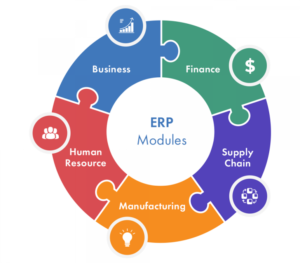ERP - Enterprise Resource Planning
What Is ERP?
Enterprise resource planning (ERP) is the integrated management of main business processes, often in real time and mediated by software and technology.
Many ERP software applications are important to companies because they help them implement resource planning by integrating all of the processes needed to run their companies with a single system.
An ERP software system can also integrate planning, purchasing inventory, sales, marketing, finance, human resources, and more.
ERPs connect every aspect of an enterprise. An ERP software system allows for better performance and project management that helps plan, budget, predict and accurately report on an organization’s financial health and processes.

Types Of ERP Systems
Cloud-based ERP
Cloud-based ERP software is a web-based solution, known as Software as a Service (SaaS)
On-Premise ERP software
On-Premise ERP software is implemented onsite and maintained in physical
Hybrid ERP
“Hybrid” ERP software refers to a combined implementation of cloud-based and on-premise ERP system solutions.
ERP - Enterprise Resource Planning
Benefits of ERP
- Cost savings
- Workflow visibility
- Reporting/analytics
- Business insights/intelligence
- Data security
- Collaboration
- Scalability
Disadvantages of ERP Systems
- System cost
- Need for training
- Data conversion costs
- Complexity
- Maintenance
ERP Modules & Features
Over time, ERP systems have grown to include support for other applications and “ERP modules” that support day-to-day business function. In many ERP systems, these common functional areas are grouped into ERP modules, including but not limited to:
- Business Modules in ERP
- Finance Modules in ERP Software
- Human Resource Modules
- Supply Chain Management Modules
- Manufacturing ERP Software Modules





